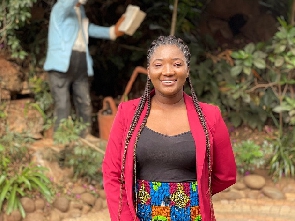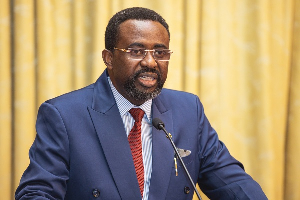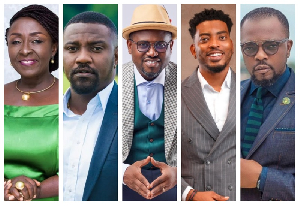The marginalised have always been the unsung heroes of recycling; Betty Osei Bonsu at the Australia EcologiQ Event.
Today, the Green Africa Youth Organization aligns itself with the global call for effective circular economy management and bolstering resilience against climate risks.
Addressing the Ecologiq Conference in Australia (#ecologiqconference2023), Betty Osei Bonsu, Country Manager of GAYO Uganda, emphasized the urgency of investing in our youth, recognizing them as today's leaders rather than waiting for tomorrow.
During her address, Osei Bonsu emphasized the importance of sustainable practices that extend beyond environmental benefits to address pressing social and economic disparities.
She was joined on stage by global circular economy experts, including Steve Betinsky, General Manager of Employment & Enterprises at OC Connections, Yasmin Grigaliunas, CEO of Circonomy (World's Biggest Garage Sale), and Joe Pickin, Director at Blue Environment.
Together, they engaged in a dynamic conversation underscoring the transformative potential of social enterprise in generating benefits that go beyond optimizing the utilization of recycled materials.
She also advocated for a legacy mindset, and alternative products- designing products for the long term and thinking about their next life.
While sharing GAYO’s incredible environmental, economic and social impact as they lead Africa’s shift to a circular economy, Bonsu said that Australia can draw inspiration from this journey of getting away from Large-scale infrastructure projects to grassroots projects that can collectively create a sustainable and resilient future for our children.
Betty says her efforts to fight for environmental conservation and protection were derived from her childhood story of waste recycling by the poor.
“As I reflect on my childhood in the heart of a rural African slum, I am transported back to a world where waste wasn't a choice; it was a lifeline. I lived in a community where discarded waste were bought at a lower cost in the market by the poor. I couldn't help but notice that those with more abundant means had the luxury of choice, a choice to discard, a choice to waste. It was in this experience that i came to the realization that: the marginalized had always been the unsung heroes of recycling, while the rich often held the privilege of squandering resources without a second thought to discard,” said the GAYO Country Manager Betty Osei Bonsu.
She added that the global waste crisis and its impact on communities presents a multifaceted challenge with far-reaching impacts on communities.
Our daily waste generation surpasses the capacity of waste management systems, exemplified by Ghana, where a UNDP report reveals that over 12,000 tonnes of waste are generated daily, yet only a mere 10% of it is effectively collected and disposed of.
This alarming statistic underscores a critical issue in waste management. Adding to this challenge is the phenomenon of global waste colonization, evident in the weekly influx of 15 million units of second-hand clothing to Ghana, of which 40% eventually becomes discarded waste.
Furthermore, Ghana grapples with an annual inflow of 150,000 tonnes of electronic waste and a staggering 2.58 million tonnes of plastic raw materials.
Tragically, while 30-40% of electronic waste remains inadequately managed, a staggering 73% of imported plastic materials are ultimately categorized as waste. These stark realities highlight the urgent need for comprehensive waste management solutions in the region.
Bonsu aptly points out that the repercussions of waste reach across multiple domains, encompassing health hazards, environmental degradation, and resource scarcity. Often, we overlook the fact that waste sent to landfills merely awaits, and does not magically go away.
The issue is exacerbated by plastic waste, as the global statistics reveal: out of approximately 90 billion tonnes (Bt) of plastic materials extracted and utilized for manufacturing annually, a mere 9% undergoes recycling, exacerbating the crisis.
In light of these pressing challenges, Bonsu urges governments and humanitarian agencies to prioritize youth-led initiatives. Such prioritization is crucial for realizing the objectives and commitments laid out in the Paris Treaty. By empowering young leaders, we can catalyze transformative change and work collectively towards a more sustainable and resilient future.
“If you look at a story like that of the Green Africa Youth Organization (GAYO) that began a few years back as a student-led initiative has now grown to encompass nearly 50 employees, engage over 7,000 volunteers, support 10 community grassroots projects, and empower more than 10,000 young individuals across the African continent with projects replicated from Ghana to Uganda, Kenya, Botswana, and Mali,” Bonsu said.
What More is GAYO doing?
Advocacy; We are able to Incorporate climate education into community projects and schools to raise awareness about climate risks and solutions. We have established eco-clubs within universities that serve as ambassadors and environmental stewards. Embark on community sensitization to instigate behavioural changes.
Infrastructure and enabling systems; Material recovery Facilities serve as hubs for training, and also as recycling and sorting grounds for segregated waste. Buyback centres are created within communities to assist in the communal recovery of waste. There are fixed costs for returning plastic waste we are also establishing coin-based refillable water dispensers to prevent the excessive purchase of plastic refills.
Capacity building and job creation;
Capacitate women and youth, to embark on green jobs and activities for income. We train them to use municipal waste as raw materials e.g. upcycling of plastics like drinking water sachet bags and bottles to raincoats, handbags, aprons, urban gardens, composting, and mushroom farming. These in turn develop into community-based enterprises fostering a circular economy that generates economic opportunities and reduces environmental impact.
Empowerment of marginalized groups; we undergo integration of the informal waste pickers and onboarding of community ambassadors. Here we acknowledge their contribution in waste management and the need for recognition from major stakeholders.
Influencing policy; working with Municipal Assemblies to integrate no burning laws into local policies. A major policy document is the zero-waste strategy Ghana document- it contains proper waste management guide for municipalities.
About EcologiQ Conference
The ecologiQ Greener Infrastructure Conference 2022 invited world leaders in sustainability to Melbourne’s Convention and Exhibition Centre. The 2-day conference included a range of keynote speakers, panel discussions, networking events, masterclasses and a dynamic trade hall where recycled product suppliers will show how effectively waste can be transformed into vital construction materials.
The conference is being delivered by our ecologiQ program, which is leveraging Victoria’s significant infrastructure investment to boost the use of recycled and reused materials, make these products business-as-usual and help Victoria build local markets.

Press Releases of Thursday, 21 September 2023
Source: EcologiQ Conference

















